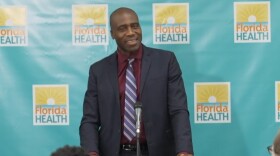-
A federal judge in Miami has set a $60,000 bond for U.S. Rep. Sheila Cherfilus-McCormick. She's facing charges of conspiring to steal $5 million in federal disaster funds meant to combat COVID-19 in 2021.
-
Prices are spiking as temporary COVID-era subsidies end and insurers raise rates to offset people leaving the coverage pool. For many, the premiums will be too high to retain their plan.
-
The Board of Pharmacy cited a state law that allows pharmacists to administer FDA-approved vaccines. Publix and Walgreens said they would be offering the shot without a prescription to eligible recipients.
-
The U.S. Food and Drug Administration approved 2025-26 COVID-19 vaccines for anyone age 65 and older and any person 6 months and older who has at least one underlying health condition that increases their risk of severe COVID-19 infection.
-
Once again, a summer wave of COVID-19 is spiking across the country and in Florida. Orange County reported the third-highest case totals in the state, according to the Department of Health.
-
Dr. Joseph Ladapo also praised the federal government's decision in May to no longer recommend COVID-19 mRNA vaccines for healthy children and pregnant women.
-
A federal appeals court has rejected allegations of false imprisonment and intentional infliction of emotional distress against Celebrity Cruises in a lawsuit filed by two Filipino crew members who were forced to remain on board during the early months of the COVID-19 pandemic.
-
More young birder groups are popping up across the country for teens and tweens who enjoy getting outdoors together to gawk at wildlife.
-
USF public health professor Donna Petersen says collaboration was critical in helping community leaders respond to the pandemic. In hindsight, she says interventions like shutdowns were in place too long.
-
Anyone who got sick with COVID-19 during the summer wave in South Florida has some protection against a future infection, but not full protection against germs spreading in fall and winter. Infectious disease experts recommend what shots to get now.
-
There's a new bulletin from Florida's surgeon general. Vaccine experts and historians interviewed for this article can’t remember another state health leader urging residents to avoid an FDA-approved vaccine.
-
The state agency advises people to skip the shot because it doesn’t target the current dominant variant. A USF epidemiologist says it will still be effective but suggests first asking whether you need the booster.
Play Live Radio
Next Up:
0:00
0:00
Available On Air Stations










